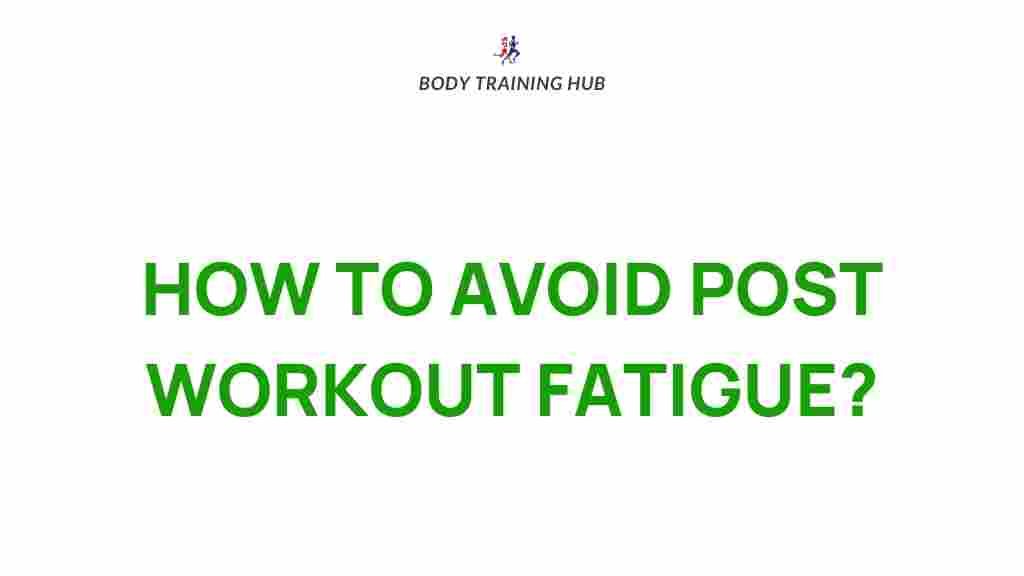Uncover the Secrets to Banishing Post-Workout Fatigue
Post-workout fatigue is something almost every fitness enthusiast experiences at some point. It can leave you feeling drained and unable to fully enjoy the benefits of your exercise routine. However, understanding the causes of post-workout fatigue and implementing strategies to minimize its effects can help you bounce back faster and feel more energized after your workouts. In this article, we will explore the key factors behind post-workout fatigue, practical tips to combat it, and how you can optimize your recovery for better results.
What is Post-Workout Fatigue?
Post-workout fatigue refers to the exhaustion and muscle soreness that occurs after intense physical activity. While it is a natural part of any fitness regimen, it can sometimes linger for longer than expected, hindering your ability to perform well in subsequent workouts. This fatigue is typically caused by muscle microtears, dehydration, nutrient depletion, and the body’s effort to repair itself. The good news is that there are proven strategies to help reduce this fatigue and support faster recovery.
Key Factors Behind Post-Workout Fatigue
- Muscle Microtears: During exercise, especially strength training, your muscle fibers undergo tiny tears. This is a normal part of the muscle-building process, but it also contributes to soreness and fatigue.
- Dehydration: Sweating during a workout can lead to significant fluid loss. Without proper hydration, your body may struggle to recover, leading to prolonged fatigue.
- Nutrient Depletion: Intense exercise can deplete your body of essential nutrients, particularly electrolytes, glycogen, and amino acids, which are crucial for muscle recovery.
- Overtraining: Excessive exercise without adequate rest can result in overtraining syndrome, a condition marked by persistent fatigue, decreased performance, and potential injury.
How to Combat Post-Workout Fatigue
While post-workout fatigue may be unavoidable to some extent, there are several strategies you can use to speed up recovery and minimize its impact. Let’s delve into the best practices to prevent and manage fatigue after exercise:
1. Prioritize Hydration
One of the most effective ways to reduce post-workout fatigue is by ensuring you stay well-hydrated before, during, and after exercise. Water helps transport nutrients throughout the body, aids in muscle repair, and combats dehydration, which can significantly worsen fatigue.
- Drink at least 16-20 ounces of water before your workout.
- Replenish with an additional 8-10 ounces of water for every 20 minutes of exercise.
- Consider electrolyte drinks or coconut water to replace lost minerals like sodium, potassium, and magnesium.
2. Refuel with the Right Nutrients
Post-workout nutrition is crucial in restoring energy levels and promoting muscle recovery. Focus on replenishing glycogen stores, repairing muscles, and boosting your overall recovery with the right balance of macronutrients.
- Carbohydrates: Replenish glycogen stores by consuming complex carbs like sweet potatoes, quinoa, or whole grains.
- Proteins: Protein is essential for muscle repair. Opt for lean proteins like chicken, fish, or plant-based sources like lentils and tofu.
- Healthy Fats: Include healthy fats such as avocado, nuts, or olive oil to support overall recovery and hormone regulation.
3. Get Enough Sleep and Rest
Sleep is one of the most powerful tools for recovery. The body uses deep sleep stages to repair tissues, replenish energy stores, and regulate hormones. Aim for at least 7-9 hours of quality sleep each night to support recovery and reduce post-workout fatigue.
If you find it difficult to sleep after a particularly intense workout, try incorporating relaxation techniques such as deep breathing, meditation, or stretching before bed.
4. Active Recovery
Engaging in light, low-intensity exercise after a tough workout can help promote blood circulation and reduce stiffness. Activities like walking, yoga, or swimming can provide an active recovery that accelerates muscle healing without putting additional strain on your body.
5. Supplement Wisely
Supplements can play a key role in reducing post-workout fatigue and speeding up recovery. Some effective supplements include:
- Branched-Chain Amino Acids (BCAAs): BCAAs help with muscle repair and reduce muscle soreness.
- Creatine: Known for enhancing performance, creatine also helps replenish energy stores and reduce fatigue.
- Magnesium: Magnesium supports muscle relaxation and helps combat cramping and fatigue.
6. Listen to Your Body and Avoid Overtraining
Overtraining is a major cause of prolonged fatigue and can lead to burnout, injury, and setbacks in your fitness journey. Pay attention to your body’s signals and take rest days when necessary. If you’re constantly feeling fatigued or sore, consider scaling back your workout intensity or incorporating more rest days into your routine.
Troubleshooting Post-Workout Fatigue
If you are still struggling with excessive post-workout fatigue despite following the tips above, consider the following troubleshooting steps:
- Review Your Diet: Are you eating enough to fuel your workouts? Lack of proper nutrition can exacerbate fatigue.
- Check for Underlying Health Issues: Conditions like anemia, thyroid imbalances, or chronic stress can contribute to prolonged fatigue. It may be worth consulting a healthcare professional if you suspect an underlying issue.
- Evaluate Your Workout Routine: Are you pushing yourself too hard? If you’re constantly experiencing fatigue, you may need to adjust your workout routine to avoid overtraining.
Conclusion
Post-workout fatigue doesn’t have to derail your fitness journey. By understanding the root causes of fatigue and implementing targeted strategies like proper hydration, nutrition, and rest, you can reduce its impact and enhance your recovery process. Consistency with these recovery strategies will ultimately allow you to perform better, feel more energized, and continue to make progress toward your fitness goals.
Remember, recovery is just as important as the workout itself. By prioritizing recovery, you can push past the exhaustion of post-workout fatigue and unlock your full potential. For more tips on fitness recovery, click here to explore further resources.
If you’re interested in the science of muscle recovery, learn more at this external resource for additional insights into post-exercise fatigue.
This article is in the category Strength & Recovery and created by BodyTraining Team
